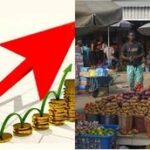The Federal Government of Nigeria is set to implement a significant economic measure aimed at curbing inflation by suspending import duties on essential items for a period of six months.
This decision, outlined in an executive order reviewed by Nairametrics, targets staple food items, pharmaceutical products, and other critical commodities.
Join our WhatsApp ChannelAccording to the document, which is yet to bear the President’s signature but has been verified by Nairametrics, the suspension will encompass import duties on staple foods, raw materials crucial for manufacturing, agricultural inputs like fertilizers and seeds, pharmaceuticals, and poultry feeds, among others.
“The Inflation Reduction and Price Stability Order mandates strategic interventions to stabilize prices and support key sectors,” the document states. It further directs the Ministry of Finance and the Central Bank of Nigeria to facilitate low-interest loans aimed at bolstering the agriculture, pharmaceutical, and manufacturing industries.
READ ALSO: CBN Raises Exchange Rate For Import Duties To 1457$1
Additionally, the executive order hints at a potential suspension of value-added tax (VAT) on automotive gas oil, basic food items, semi-processed staple foods such as noodles and pasta, and raw materials for food production. This measure is expected to remain in effect for the rest of the year.
In a move aimed at addressing food inflation, the government is contemplating the importation of paddy rice and maize seeds, as highlighted in the Accelerated Stabilization and Advancement Plan (ASAP) submitted by Finance Minister Wale Edun. This plan underscores the urgency of mitigating rising food costs that have significantly impacted household budgets.
However, these measures appear to contradict earlier statements by President Tinubu, who had expressed reluctance towards continued food imports earlier this year, emphasizing self-sufficiency as a long-term strategy.
Nigeria is currently grappling with a severe food crisis, marked by a 40.5% food inflation rate. The cost of rice alone has surged by 169% in the past year, reaching nearly N90,000 per bag, exacerbating economic pressures and threatening food security for millions.
Experts warn that without immediate intervention, an estimated 31 million Nigerians could face acute food shortages by August, underscoring the urgency of government action beyond economic implications, impacting health, education, and overall societal stability.
This executive order, if enacted, aims not only to stabilize prices but also to provide relief to vulnerable households amidst mounting economic challenges.
Emmanuel Ochayi is a journalist. He is a graduate of the University of Lagos, School of first choice and the nations pride. Emmanuel is keen on exploring writing angles in different areas, including Business, climate change, politics, Education, and others.



















Follow Us